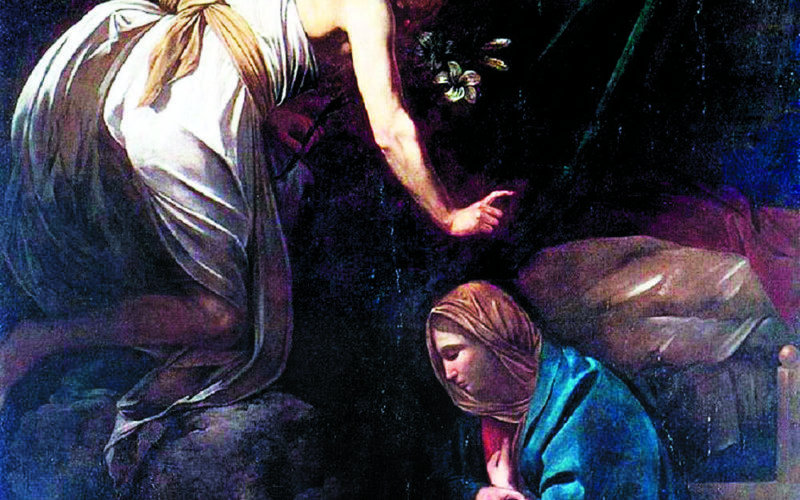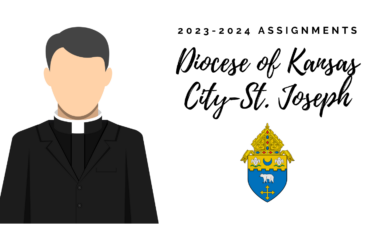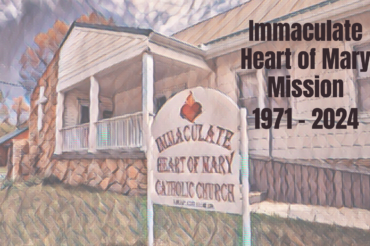Bearing Fruit in Christ
Detail: “The Annunciation” by Caravaggio, c. 1608-10. March 25 is the Feast of the Annunciation.
According to the U.S. Department of Transportation, you are 37 times more likely to die in a motorcycle accident than a car accident. In fact, the risk of a fatal crash per mile traveled, is 35 times greater for motorcyclists than a passenger car.
It is also true that in 42 percent of all accidents involving a motorcycle and car, the person at fault is the driver of a car. Someone could truthfully claim that on the surface riding a motorcycle is not inherently more dangerous, it is the fault of other drivers. Yet, whoever is to blame, the unavoidable truth remains: riding a motorcycle is still extremely dangerous when compared to a car.
In today’s Gospel, Jesus highlights an unavoidable spiritual truth. Each person in this life is born with an immortal soul. During our earthly life we have the chance to either accept or reject divine grace (CCC 1021). This leads each of us to an important decision which Jesus repeats two times in our Gospel, “No, I tell you; but unless you repent, you will all perish as they did” (Luke 13:3, 5).
At the moment of death there is a particular judgment by Christ. However offensive this might be to the modern mind, here are only two possibilities; heaven or hell. We must either face “entrance into the blessedness of heaven-through a purification or immediately,” – or, and there is no way to soften this, “immediate and everlasting damnation” (CCC 1022).
Yet, Jesus goes on to share a parable about mercy. The owner of the vineyard in this parable is extremely patient. He is willing to give the unfruitful fig tree, fertilizer and one more year to bear fruit. But the owner’s patience is not without limit. He tells the gardener, “If it bears fruit next year, well and good; but if not, you can cut it down” (Luke 13:9).
Now, we need to be clear that Sacred Scripture teaches that God “desires all men to be saved and to come to the knowledge of the truth” (1 Timothy 2:4) and that God is patient “not wishing that any should perish but that all should come to repentance” (2 Peter 3:9). Or as the Psalmist reminds us today, “The LORD is merciful and gracious, slow to anger and abounding in steadfast love.” It is also true that God alone knows each person’s heart. Yet as Jesus’ parable of the fig tree teaches, this earthly life is the natural and unavoidable limit to God’s patience, and no one knows the day or hour on which he or she will die.
Our second reading from St. Paul talks about the lives of the Israelites. Like modern baptized Catholics, the Israelites entered into a covenant with God. St. Paul gives a spiritual interpretation of the events of Israel’s history which parallels the Christian sacraments. The Israelites were “baptized into Moses in the cloud and in the sea, and all ate the same spiritual food, and all drank the same spiritual drink” which was Christ.
Yet instead of embracing the graces of this sacramental life, many of them complained, desired evil, and disobeyed God. Paul tells us that these things were recorded as examples to warn us not to do likewise. He warns, “So if you think you are standing, watch out that you do not fall” (1 Corinthians 10:12).
As the catechism reminds us, there are two sins against the virtue of hope. The first is the sin of despair, where a person doubts God’s promises and his ability to save. There is no sin that cannot be forgiven, except perhaps to deliberately not ask God for forgiveness, because you doubt God can save you (CCC 2091).
The second sin against hope is presumption, which has two forms. First, someone can presume upon their own capacities, believing that they can save themselves through their own efforts. This sin generally leads to pride, legalism, judging others, and ultimately to a very negative and false understanding of our relationship with God.
At the opposite extreme, someone can “presume upon God’s almighty power or his mercy (hoping to obtain his forgiveness without conversion and glory without merit)” (CCC 2091). This kind of thinking starts out with a half-truth. God loves all the fig trees in his garden, which is true. It continues through, by implying that it doesn’t matter to God if we ever bear any fruit. Presuming falsely on God’s mercy, this sin claims God will be patient forever. Yes, our God is loving and merciful, but we all still need to respond and be transformed by his grace and Jesus taught that there is a limit to God’s patience.
None of us can escape the call to personal conversion and holiness. For some this requires an initial surrender to God. A decision to place Jesus at the center of our life, and to enter into personal relationship with him.
Someone else may look back in their life, however, and assume that this initial conversion has already taken place. The catechism warns us, that “Christ’s call to conversion continues to resound in the lives of Christians. This second conversion is an uninterrupted task for the whole Church” (CCC 1428).
Like the fig tree in Jesus’ parable, and the Israelites St. Paul reminds us of, we must continually examine ourselves to ask if we are bearing fruit. Lent is a time to examine ourselves and to journey deeper in our relationship with Christ. In fact, the Church calls upon all of the faithful, to examine their hearts and to go to Confession during Lent.
During the current Holy Year of Renewal, a special initiative is underway called, The Light Is On For You, which will provide additional Confession times at parishes throughout the diocese and encouragement to rediscover the beauty of the Sacrament of Reconciliation.
Deacon Scott McKellar is Pastoral Associate at St. Therese Parish, North.
Click here to view this Sunday’s readings on the USCCB website




